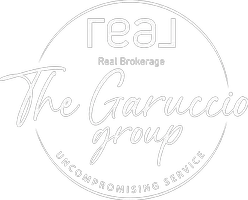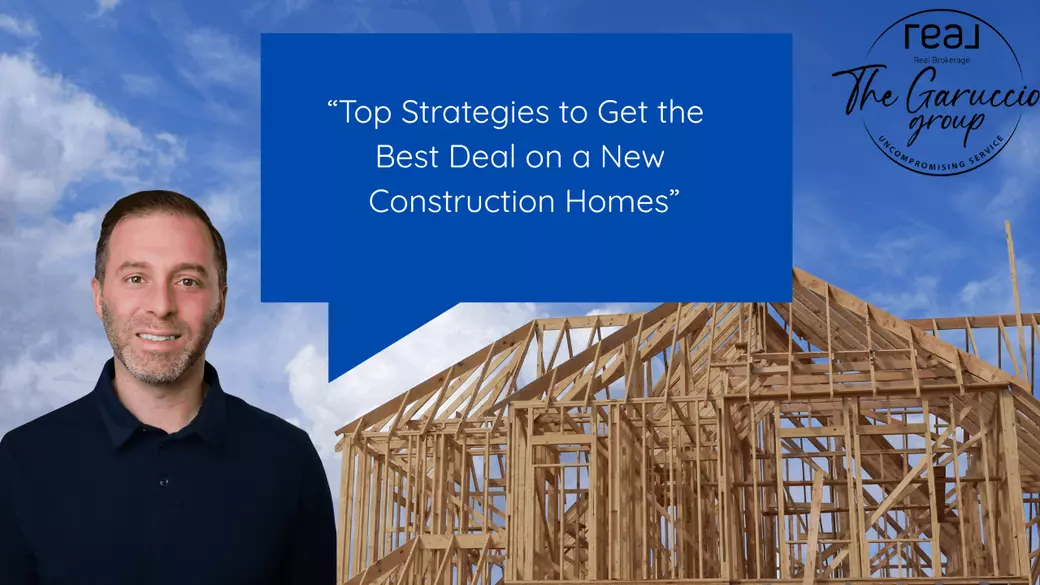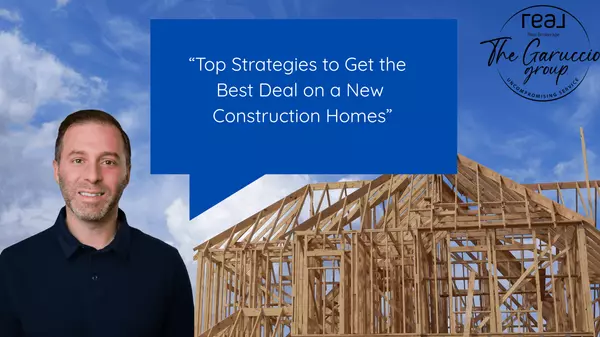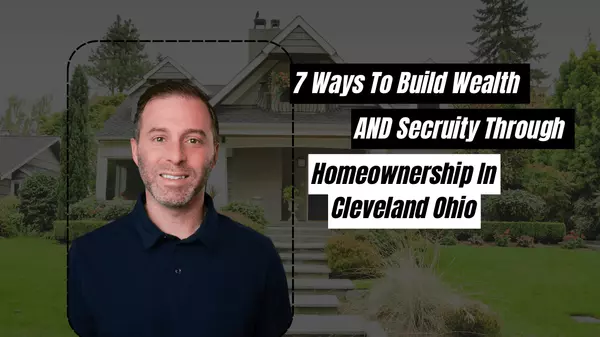
- Home
- Communities
- Buy
- New Property Search
- Bay Village Homes For Sale
- Rocky RIver Homes For Sale
- Fairview Park Homes For Sale
- Westlake Homes For Sale
- North Olmsted Homes For Sale
- Lakewood Homes For Sale
- Avon Homes For Sale
- Avon Lake Homes For Sale
- Olmsted Falls/Township Homes For Sale
- Settlers Reserve Westlake Homes For Sale
- Cashelmara Condominiums Bay Village Ohio
- Cashelmara Condominiums Bay Village Ohio(copy)
- Huntington Woods Bay Village
- Laurel Woods North Olmsted
- Our Sold Listings
- Featured Listings
- Sell
- About
- Contact Us
- Blogs & Education
- Preferred Partners
- Register
- Sign In
How to Get the Best Deal on a New Construction Homes
by Tom Garuccio

Tips for Getting the Best Deal on New Construction Homes in Westlake, Ohio
Top Strategies to Get the Best Deal on a New Construction Home in or Around Westlake, Ohio
Building a new home? Savvy buyers in Westlake, Ohio can score big savings with the right approach.
Buying a brand-new home is exciting, and with the right strategies, you can save thousands and get extra perks. In Westlake, Ohio (and surrounding Cleveland suburbs), builders are eager to attract buyers, which means opportunities for negotiations and incentives if you know where to look. Below are the best tips and tricks to negotiate pricing, secure favorable terms, and maximize incentives when buying new construction in the Westlake area.
1. Negotiate on Upgrades and Credits, Not the Base Price
Builders often stick to their list price on a new home to keep neighborhood values high, so they may refuse to budge on the base price in most cases. Don’t let that discourage you. Instead, shift the negotiation to upgrades and credits that add value for you without technically lowering the home’s sale price. For example, ask the builder to include high-end appliances, premium countertops, or upgraded flooring at no extra cost) Builders can sometimes get materials cheaper via their suppliers, so they might throw in an upgrade or two for free rather than cut the price You can also request a design center credit (money toward picking your custom finishes) or closing cost assistance so that the builder covers some of your out-of-pocket fees at closing These perks save you money without the builder having to publicly lower the home price.
Pro tip: Builders typically avoid lowering prices because future buyers (and appraisers) will see those sales and expect similar pricing. They don’t want to “set a precedent” that could undercut the value of other homes in the development. However, they’re often willing to add value in other ways – so speak up and ask for extras that matter to you. It never hurts to ask, and you might be surprised what a builder will agree to in order to secure the sale
2. Time Your Purchase for Maximum Incentives
When you buy can be just as important as what you buy. Builders tend to offer their juiciest incentives at certain times. A smart strategy is to shop toward the end of the quarter or end of the year. Many builders work on quarterly and annual sales targets – if they need a few more sales to hit their goal, they may sweeten the deal for you if you sign a contract before the period ends In fact, signing a contract near the end of a quarter or the builder’s fiscal year will often yield the most attractive incentives This might come as extra closing cost money, free upgrades, or even a temporary price reduction on a specific home the builder wants to move.
Seasonally, the winter months can be slower for home sales in Northeast Ohio, so builders may be more motivated. Think of December as “deal month” – it’s typically one of the best times to snag year-end builder incentives and discounts. For example, a Westlake-area builder might offer a “Holiday Special” promotion, such as a free finished basement or discounted lot premium, to lock in contracts before December 31. By contrast, in the busier spring selling season, you might see fewer deals since demand is higher.
Keep an eye out for communities in “close-out” phase – when only a few homes are left. Builders often roll out major incentives to sell those last units. In the Westlake area right now, some new home communities are advertising tens of thousands of dollars in savings on their final available homes. One development recently offered $25,000 off the remaining high-end model as a close-out special and others have promoted “Up to $15,000” in incentives on more moderately priced homes to attract buyers . The last home in a neighborhood or a model home (often sold at the end) is where you might actually get a price cut in addition to upgrades – since at that point the builder isn’t worried about future sales values Timing your purchase to coincide with these scenarios can dramatically improve the deal you get.
3. Maximize Builder Incentives and Freebies
Builder incentives are promotions or freebies that developers offer to sweeten the deal for new buyers, and right now they are both common and generous. In fact, nearly 60% of builders are using sales incentives to entice buyers in today’s market (nar.realtor) You should take advantage of these offers. Here are some incentives to look for and request:
-
Closing Cost Credits: It’s very common for builders to offer to pay some of your closing costs (fees for the loan, title, etc.), especially if you use their preferred lender. This could save you several thousand dollars at the closing table. Builders like M/I Homes, for example, frequently advertise significant closing cost assistance when buyers finance through their in-house lending arm. Always ask if the builder will cover all or part of your closing costs – it’s often a standard incentive in new construction deals.
-
Mortgage Rate Buy-Downs: With interest rates higher lately, many builders are stepping up to buy down your mortgage rate for a period of time. They might offer a special low introductory rate for the first couple of years, or even a slightly reduced fixed rate, by paying points on your behalf. This can shave hundreds off your monthly payment, making the home more affordable for you. Ask about any financing incentives like temporary 2-1 buydown programs or long-term rate lock opportunities – for instance, some builders will lock your rate for 6+ months while the home is being built, protecting you from rate increases.
-
Free or Discounted Upgrades: Rather than haggling on price, get the builder to throw in some upgrades at no charge. Common requests include higher-end kitchen appliances, better quality flooring or cabinets, an upgraded front elevation, or smart-home features. Many builders are willing to include at least a few “extras” at their cost – they may have wholesale deals with suppliers, so it costs them less than it would cost you to add later. Think about what would make the home perfect for you (maybe a morning room addition or a finished rec room) and put it on the negotiation table. It’s often cheaper for the builder to add it now than for you to renovate later, so it can be a win-win.
-
“Flex Cash” or Design Center Credit: Some builders offer a lump sum credit that you can spend on options of your choice. For example, you might get $10,000 in “design center” credit to personalize your finishes – whether that’s choosing upscale countertops, custom lighting, or special-order fixtures. Use this flex money strategically on things that would be expensive to change post-build.
-
Pre-Paid HOA Dues or Fees: If your new home will have a homeowners association, ask if the builder will pay the first year of HOA fees as part of the deal. It’s not uncommon for builders to cover a year or two of HOA dues as an incentive, which puts cash back in your pocket. Similarly, you could negotiate for free upgrades to landscaping or lot improvements – anything that eases your costs after move-in.
-
Extended Warranty or Post-Sale Service: New homes come with builder warranties on the structure and systems, often 1-2 years by default. If you’re looking for extra peace of mind, see if the builder will extend the warranty coverage or include longer-term service plans as a perk. For instance, they might agree to a 10-year roof warranty or cover any cosmetic fixes for the first year. It never hurts to ask for a little more protection – the worst they can say is no.
Bottom line: Always research what promotions builders are currently offering and don’t be shy about asking for the ones you want. In the Westlake area, with multiple new developments by builders like Pulte, Drees, Ryan Homes, K. Hovnanian, and more, there are often specials running – whether it’s free options, limited-time price reductions, or creative incentives. Builders expect informed buyers to inquire about incentives, so arm yourself with that knowledge. You might say, “I’ve seen another community offering $10,000 in upgrades – can you match that?” This signals that you’re shopping around and encourages them to put their best offer on the table to win your business.
4. Use the Builder’s Preferred Lender to Your Advantage
Nearly every big builder has a preferred lender (or even an in-house mortgage company) and they will strongly encourage you to use them. The reason? It streamlines the process for the builder – but it can also benefit you if you leverage it right. Builders often dangle extra incentives to buyers who go with their partner lender. For example, a builder might say you’ll get $5,000 toward closing costs if you finance through their preferred bank. Sometimes they offer slightly lower interest rates or special rate-lock programs as well, since the builder and lender are coordinating closely. These deals can definitely boost your savings – just be sure to compare the loan offer with outside lenders to ensure the rate and fees are competitive overall.
How to maximize this: Get a quote from the builder’s lender, including all the incentives, then also get a quote from an unrelated lender. If the independent lender has a better rate or lower fees, you can go back to the builder and give them a chance to match or beat it (often, they will adjust something to keep you). Often, the value of the builder’s lender incentives – like thousands in paid closing costs or a rate buydown – makes their package very compelling. Just read the fine print: sometimes incentives require using the builder’s lender and closing on time, etc. If you do go with the preferred lender, stay on top of the process to ensure there are no last-minute surprises. But in most cases, using the builder’s financing perks works in your favor by lowering your overall cost to buy the home. It’s essentially part of the negotiation strategy: the builder might not lower the price, but their lender might lower your costs or payments to seal the deal.
5. Know What Is (and Isn’t) Negotiable
When buying new construction, it pays to understand where you have wiggle room and where you’ll likely hit a wall. Here’s a quick guide on what you can typically negotiate – and what’s usually off-limits:
-
🏷️ Sale Price: For a new home, the listing price is usually non-negotiable (especially in a popular community). Builders rarely agree to a lower base price for one buyer because it sets a lower benchmark for all future sales in the neighborhood. The exception is if you’re buying a model home or the last house in the development – in those cases, with no future sales to affect, the builder might entertain a modest price cut. But as a rule, don’t expect a flea-market haggle on base price. Instead, focus on incentives and extras as discussed.
-
🌳 Lot Premiums: If certain lots in the subdivision cost extra (for example, a bigger yard or a prime cul-de-sac location), those premium fees are tough to negotiate. Builders usually spread land costs across all the lots, so they view every lot as having a set value that they already built into pricing. Even if you think a particular lot should be cheaper (say it’s near a road or smaller), the builder likely won’t simply knock off the premium. That said, if a premium lot has sat unsold, you can inquire about any “lot incentive” – occasionally they might offer a credit or upgrade to offset a less desirable lot’s premium, but they won’t zero it out.
-
🛠️ Structural Changes: Major changes to the floor plan or structure (like adding a room, moving walls, or altering the exterior) are often not negotiable unless you’re early enough in the process and the builder allows custom alterations. Production builders tend to stick to set plans. You can ask, but be prepared that the answer may be no, or that it will cost a fixed, non-negotiable amount.
-
🏠 Custom Upgrades: Yes, these are negotiable! As covered earlier, you have room to negotiate on finish upgrades and options – things like flooring, cabinets, fixtures, appliances, etc. The builder might throw in some for free or at a discount to keep you happy. Just make sure any agreed upgrades or design credits are written into the contract before you sign.
-
💵 Closing Costs: Yes – negotiable. It’s very common to get the builder to pay a portion of your closing costs (or all, if they’re motivated) (nar.realtor_. This is often tied to using their lender, but not always. Negotiating closing cost credits is one of the easiest wins, since it doesn’t alter the home’s sale price on paper. Always ask, “What can you do about closing costs?”
-
📅 Timeline and Completion Date: Generally not negotiable. The construction schedule is subject to weather, supply chains, and labor availability. Especially in recent years, with some supply shortages, builders won’t promise a faster completion than their normal timeline. It’s one of those areas you have to be patient on. (However, if you need to delay closing a bit for your own reasons, sometimes they’ll work with you on timing – just don’t expect them to finish the house sooner than planned.)
-
🎁 Post-sale Touch-ups or Warranty Terms: Possibly negotiable. While builders have standard warranty periods, you could ask for a little extra, such as them being on the hook for cosmetic repairs for 60 days instead of 30, or an extension of the general warranty from 1 year to 2 years. They might have a policy against altering this, but some smaller builders or those hungry for a sale might say yes. It falls under “favorable terms” that you can try to secure. At the very least, ensure you understand exactly what the warranty covers and for how long, so you know where you stand.
Remember, every builder is different. Some might have a strict no-negotiation stance publicly, but behind closed doors, they’ll offer incentives or concessions to get a contract signed. Others might genuinely hold firm. By knowing the common ground (upgrades, closing costs, financing perks) and the tough ground (price, lot cost), you can focus your efforts where they’re likely to pay off. And as always, keep requests polite but firm – you want to come off as a serious buyer who simply wants the best value. In most cases, the builder’s rep will respect that and work with you to find a middle ground that makes both sides happy.
6. Consider Quick Move-In Homes and Model Homes
If you have some flexibility in which home you buy, ask about any “quick move-in” homes or spec homes the builder has on hand. These are houses that are already built or nearing completion (often because they were a model or a previous buyer’s deal fell through). Builders do not like inventory sitting unsold – an empty spec home ties up their money. As a result, a newly completed home that’s ready now can be a bargain opportunity. Builders will often load these homes with popular upgrades and then offer them at a competitive price with added incentives to get them off the books. It’s not unusual to see a spec home in Westlake come with a free finished basement or appliance package included, or a temporary price reduction, simply because the builder wants to move it fast.
The model home in a community is another potential deal. Builders typically sell the fully decorated model last, after the rest of the neighborhood is sold out. Model homes often have every upgrade in the book (flooring, trim, built-ins, you name it) since they were meant to showcase the best features. By the end, the model might have been gently used as an office or for tours, but never actually lived in. You can often buy a model home at a discount relative to its upgrades – basically, you’re getting a top-of-the-line version for less than it would cost to replicate it. One Cleveland-area real estate guide notes that the model is usually “priced at the top of the range but at a discount due to it being a former model”. In other words, the builder might have originally valued all those upgrades at, say, $100K above base, but when selling the model, they might only charge an extra $50K for them. That’s a built-in savings for the savvy buyer who waits for the model release.
If you go the spec or model route, still negotiate! Just because it’s already built doesn’t mean you can’t ask for closing costs or minor fixes. However, if the home is a hot commodity (say, one of the last new homes in a desirable Westlake subdivision), be ready to act quickly. The recent market has shown that well-priced spec homes don’t linger long when they come with big incentives – other buyers will jump on them. So, have your financing lined up and be ready to sign when you find “the one” at a great deal.
7. Don’t Go It Alone – Leverage an Experienced Real Estate Agent
Finally, one of the best moves you can make as a buyer is to work with a buyer’s agent who knows new construction. Many people think that if you walk into a model home and buy directly from the builder’s rep, you might get a better deal because there’s no agent commission. This is a myth – the sale price will not drop just because you’re unrepresented. In fact, the builder has likely built the agent’s commission into their marketing budget already. If you don’t bring your own agent, the builder either keeps that money or pays their own sales staff – you won’t get it as a discount. “If you do not have an agent, these commissions are kept by the builder and you are left without representation. The purchase price will not be lowered by the commission amount". So, going solo doesn’t save you a dime, but it does mean you miss out on having an expert advocate on your side.
A knowledgeable real estate agent who’s familiar with Westlake and Cleveland-area builders can be invaluable. They’ll know which builders are more flexible on incentives, what promotions are currently available, and how to negotiate the contract terms to protect you (for example, avoiding unrealistic escalation clauses or ensuring quality inspections. A good agent can also help you compare different developments – sometimes a similar home in a neighboring town like Avon or North Olmsted might offer a better deal, and you’d want to know that before you sign. Essentially, your agent becomes your personal new-construction consultant, at no out-of-pocket cost to you (builders pay them from a separate fund). They can also keep the process fair – if a builder knows you have representation, they’re less likely to try to gloss over important details or push you into unfavorable terms.
So, when you’re aiming to get the best deal on that dream new home, make sure you’re not alone at the negotiating table. An experienced agent will help you secure the best price, incentives, and terms – and they’ll have your back if any issues arise during construction. It’s like having a seasoned coach for one of the biggest purchases of your life.
In summary, buying a new construction home in Westlake, Ohio, can be very rewarding – you get a brand-new house tailored to your tastes – and with these tips, it can be a great financial decision too. Remember to time your purchase wisely (seasonal deals are real!), ask for those incentives (the worst they can say is no), and focus on total value (price plus all the extras). Do your homework on what each builder is offering, and don’t hesitate to negotiate for a deal that works for you. With the right approach (and a bit of professional guidance), you’ll be able to unlock maximum value on your new home purchase – getting not just a house you love, but a savvy deal you can feel great about for years to come.
Sources: The above tips are informed by expert real estate insights and local market knowledge, including recommendations from new construction specialists and data on current builder promotions in the Westlake/Cleveland area. Studies show most builders are offering incentives like closing cost help, rate buydowns, and upgrade credits in today’s market, and Cleveland-area agents note that timing your purchase at year-end or at a community’s close-out stage can yield big savings. Always ensure any promises are put in writing and review the contract carefully – and enjoy the process of making that brand-new Westlake home your own!
Categories
Recent Posts










